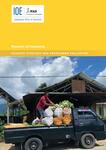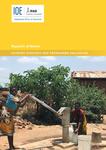Page Header
Nigeria Country Programme Evaluation
Overview
Over the last 30 years, IFAD has supported ten projects in Nigeria for a total cost of US$795.3 million, of which IFAD has provided US$317.9 million. This is the second country programme evaluation and it covers the partnership between IFAD and the Government from 2009 to 2015. The CPE found a clear trajectory of an evolving country programme that reflects deliberate efforts to adapt to changing priorities, realities and needs. The 2010-15 COSOP has built on the strengths of IFAD in Nigeria, while refocusing the programme on agriculture, in line with Government's policy priorities. The programme has targeted poverty well in the projects and programmes in the North and Middle Belt. The most significant achievement according to the evaluation was the creation of community-based organizations through which local governments were able to channel funding into otherwise hard-to-reach places. These committees continue to play an active role in planning community infrastructure and managing community assets in a sustainable way. In the Niger Delta in the South, population densities are high and market access is better, hence IFAD focussed on rural employment creation for the large youth population and the women remaining in rural areas, as well as on the promotion of on- and off-farm enterprises. Overall, there were results in increased incomes, social capital, food security and productivity, but the achievements were hampered by slow release of funding and implementation delays, particularly in the early years of programme life. Political uncertainties caused by changing governments and the institutional complexities within the federal system were major factors that affected the performance of the programme. The difficulty of the context calls for deeper analysis of governance and other crosscutting issues, including youth, gender, natural resource management, pastoralism, and conflict and fragility, to be built into IFAD's strategy for future engagement.Report Details
| Year Published | |
| Type | |
| Joint | No |
| Partner/s | N/A |
| Consultant name | |
| Agency Focal Point | Johanna Pennarz |
| Focal Point Email | j.pennarz@ifad.org |
| Managed by Independent Evaluation Office | Yes |
| Country/ies |
YOU 'RE READING
Nigeria Country Programme Evaluation









